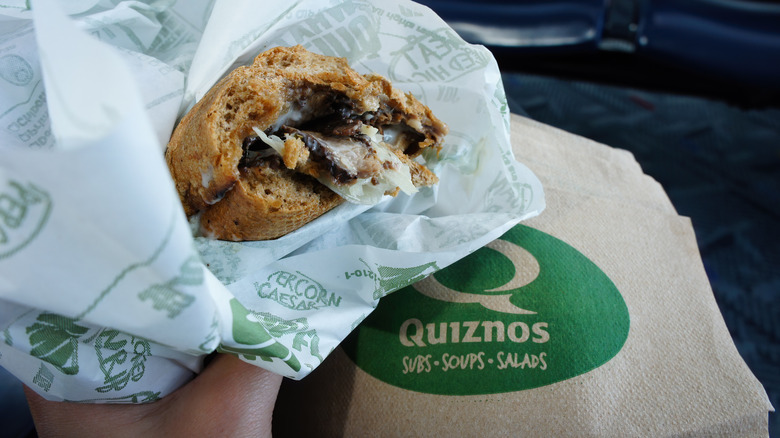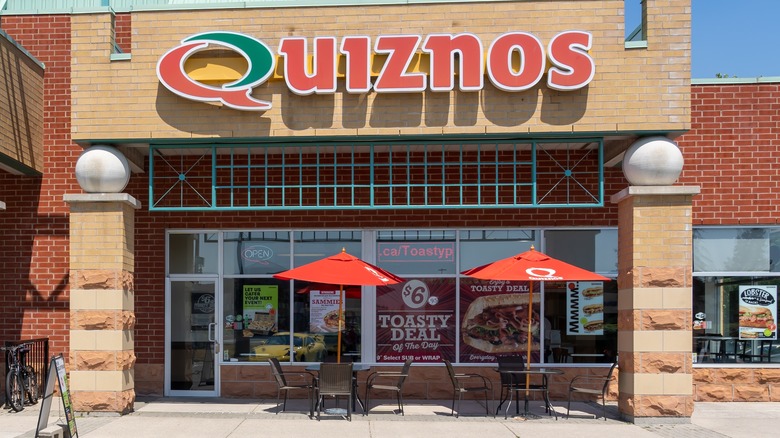The Quiznos Gyms You Probably Forgot Existed
Quiznos isn't exactly fresh on the minds of many these days. Initially, however, it seemed like the chain was destined for greatness. Quiznos got its start in 1978 in a Denver gas station turned sandwich shop. Soon enough, the brand was spreading across the country and up into Canada throughout the 1980s and '90s. By the early 2000s, the company had even reached across the pond to the U.K., all with a focus on quality, customization, and toastiness (it served warmed subs).
That wouldn't last forever. According to Restaurant Business, in 2007, the company had 4,640 locations, but by 2017, it only had 374. In just the span of ten years, the competition had gotten much tougher and a recession caused people to eat out less. The parent company also shot itself in the foot by relying on the profits from marked-up food and paper sales to franchisees, which made its locations lose money and its employees disgruntled. This was not a recipe for success. Around that same time of questionable decisions, Quiznos leadership also made the strange call to venture into the health club industry.
Quiznos launches 123 Fitness
You don't hear much, if anything, about Quiznos' gyms anymore. Yet, back in 2005, as reported by the Denver Business Journal, Quiznos CEO Rick Schaden made waves by partnering with fitness guru Ray Wilson to create 123 Fitness, an exciting new chain of health clubs. Schaden had already made a name for himself, starting as a Quiznos franchisee and working his way up the ladder until he was able to acquire Quiznos alongside his father.
Meanwhile, Wilson already owned multiple successful gym brands, as explained by Club Industry. He had become famous back in the '80s by bringing more women to the industry with a renewed focus on cardio health. Wilson also championed the Life Cycle, a digital bike that showed riders their speed and mileage, which drew in more clients. Switching from long-term gym contracts to monthly dues and initiation fees had paid off big time for him, as well. Wilson was as entrepreneurial as he was healthy.
In order to set itself apart from its competition, 123 Fitness focused on 30-minute exercise routines. This model was also meant to increase turnover so customers didn't have to share machines or feel overwhelmed by complicated workouts. Unfortunately, things didn't go very smoothly for the company.
Quiznos 123 Fitness was unsustainable
Just like Quiznos itself, 123 Fitness saw a steep decline during the mid-2000s. As documented by the Franchise Times, two out of every three 123 Fitness franchises would close, with owners left in debt or bankruptcy. There just weren't many customers interested, despite what the parent company had assured its franchisees. The franchises also had to spend a lot of money on expensive equipment and rent but weren't allowed to sell merchandise, training services, or even drinks to turn a profit. Brand-wide membership discounts didn't help. The parent company was losing millions of dollars. Equipment sales and royalty payments just weren't enough to keep the venture afloat long-term. It couldn't even afford ads to lure more people in.
Flash forward to the early 2020s and Quiznos is trying to turn over a new leaf. QSR Magazine reports the company is introducing new kitchen equipment, like a flat-top grill and deep fryer, as well as new worldly food offerings. The goal is for stores to be sleek and modern, yet unique to their communities, and to focus on speed, takeout, and drive-thru alongside in-restaurant dining. Notably not mentioned is any connection to health club brands. It seems 123 Fitness isn't exploding back onto the scene anytime soon.


